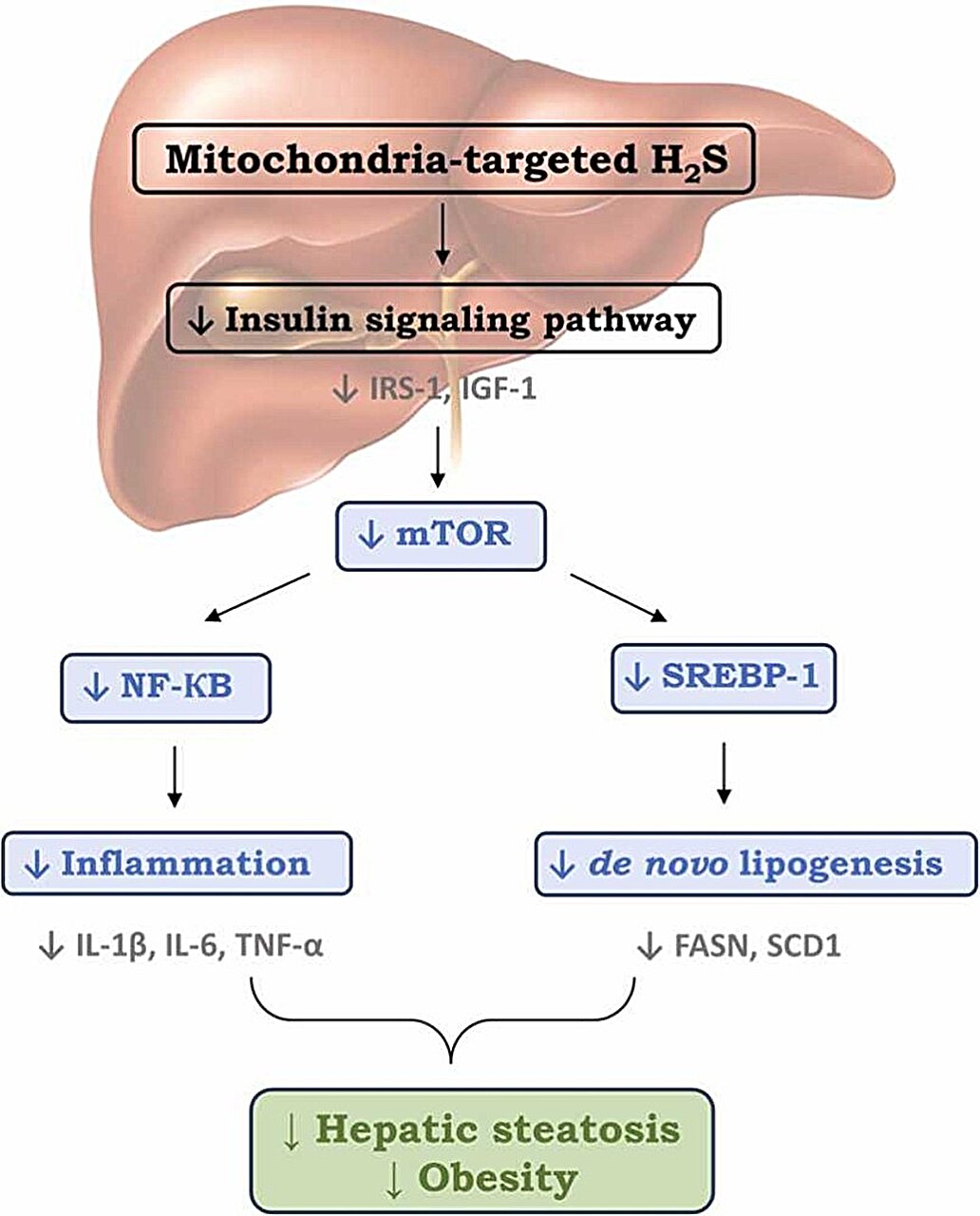
Therapies that deliver hydrogen sulfide to cells could one day become the basis of new treatments for obesity and related diseases, new research has concluded.
Mounting evidence suggests that hydrogen sulfide plays an important role in the liver. Previous research shows that tiny amounts of hydrogen sulfide in the body regulate how the liver processes fat, but up until recently, there has been no way to do that specifically. It also impacts the function of mitochondria, known as the “powerhouse” of cells, which generate energy.
The new study is led by Jagiellonian University Medical College in Poland and the University of Exeter and published in Pharmacological Research. For the study, mice who were fed a high-fat diet were injected with the compound AP39, which delivers hydrogen sulfide direct to mitochondria in cells. AP39 was invented at University of Exeter and is now owned by its spin-out company MitoRX Therapeutics.
The researchers concluded that the treatment significantly slowed the rate of weight gain, reduced by 32% on average, over the 12 weeks of the study. The team also found that treatment reduced the accumulation of fat in the liver, which can be a complication of obesity and can lead to harmful inflammation.
The study found that in the mice, treatment with AP39 reduced the activity of processes in the liver that help create certain detrimental fats in the body, build proteins that carry fat, and regulate important signals that can be harmful to the liver. It also lowered the liver’s production of new fats by preventing the activation of a key adverse metabolic pathway (mTOR/SREBP1/NF-kB).
Study co-author Matt Whiteman, Professor of Experimental Therapeutics at the University of Exeter Medical School, first began researching the role of hydrogen sulfide in the body in 2004. He first noticed that people with type 2 diabetes who were overweight had lower levels of hydrogen sulfide in their blood.
This was determined by the amount of body fat they were carrying. Higher body fat content meant lower blood sulfide levels, which in turn meant poorer sugar control and greater insulin resistance. That suggested that these adverse changes could be prevented or reversed by drug molecules that replace the lost sulfide.
Professor Whiteman said, “These early findings suggested that hydrogen sulfide could one day play a role in treating diabetes, obesity and complications arising from having too much fat in the body.
“Today, obesity is a growing global health challenge, and new and better treatments are desperately needed. If our findings that hydrogen sulfide-generating molecules that target mitochondria significantly slow weight gain translate to humans, we could be looking at an exciting new option for treatment. It is gratifying to translate these observations toward clinically viable and better drugs with MitoRx.”
Dr. Aneta Stachowicz, Department of Pharmacology at the Faculty of Medicine, Jagellonian University Medical College, Poland, and lead author of the Pharmacological Research paper, said, “Our research demonstrates that AP39 slows weight gain and significantly reduces multiple markers of obesity in mice.
“This is very exciting, and we hope it marks the beginning of a new era in the development of an innovative therapeutic approach for metabolic diseases, by using hydrogen sulfide to modulate the body’s signaling processes.”
Dr. Jon Rees, Chief Executive Officer of MitoRx, said, “This publication is a major step in MitoRx advancing our therapies which target mitochondria, and shows the huge potential for AP39 targeting a new pathway for treating obesity. Powerful international research collaborations like this help speed therapeutic advances to patients.”
More information:
Aneta Stachowicz et al, Mitochondria-targeted hydrogen sulfide donor reduces fatty liver and obesity in mice fed a high fat diet by inhibiting de novo lipogenesis and inflammation via mTOR/SREBP-1 and NF-κB signaling pathways, Pharmacological Research (2024). DOI: 10.1016/j.phrs.2024.107428
Citation:
New drug approach could underpin future weight loss therapies, study indicates (2024, October 10)
retrieved 16 October 2024
from https://medicalxpress.com/news/2024-10-drug-approach-underpin-future-weight.html
This document is subject to copyright. Apart from any fair dealing for the purpose of private study or research, no
part may be reproduced without the written permission. The content is provided for information purposes only.

